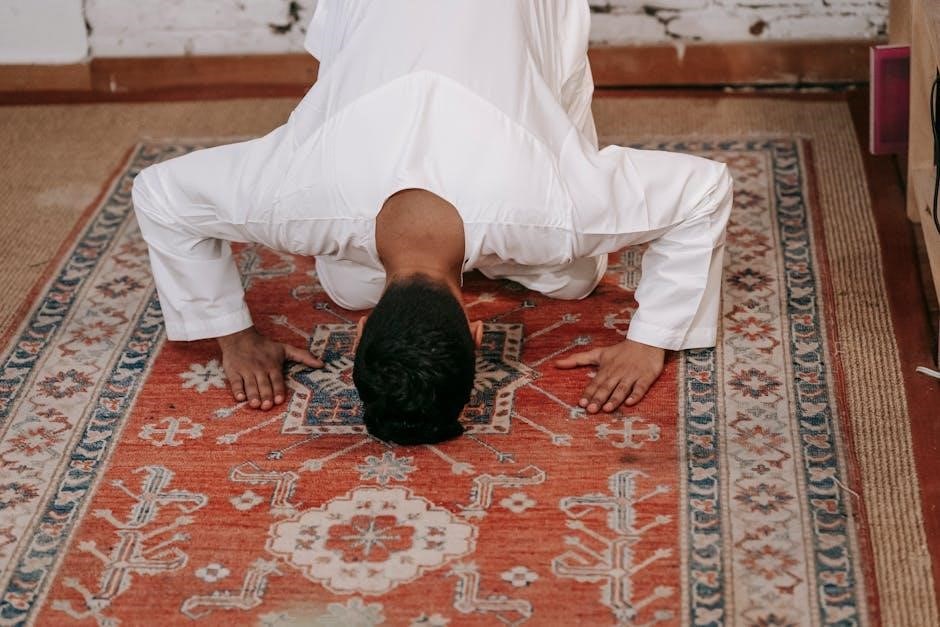Dua after Salah is a meaningful Islamic practice, fostering a deeper connection with Allah; It involves reciting specific supplications, often found in PDF resources, to seek blessings, forgiveness, and guidance.
1.1 Understanding the Significance of Dua After Salah
Dua after Salah is a powerful form of worship, fostering a spiritual connection with Allah. It allows believers to express gratitude, seek forgiveness, and request guidance. Authentic supplications, often compiled in PDF guides, ensure adherence to Islamic traditions. Reciting these du’a consistently strengthens faith and enhances the impact of daily prayers, making it a vital practice for every Muslim seeking closeness to Allah.
1.2 Importance of Authentic Supplications
Authentic supplications, sourced from the Quran and Sunnah, ensure that du’a after Salah aligns with Islamic teachings. Using verified duas, often available in PDF guides, prevents innovations and guarantees divine acceptance. These supplications, like “Istighfar” and “Dua Ya Aliyu Ya Azeem,” are trusted for their purity and effectiveness, making them essential for a sincere and rewarding spiritual practice.
Benefits of Reciting Dua After Salah
Reciting dua after Salah strengthens one’s spiritual connection, seeking mercy and forgiveness, and enriching the heart with divine blessings and daily guidance.
2.1 Strengthening the Connection with Allah
Reciting dua after Salah deepens one’s relationship with Allah, fostering intimacy and submission. It allows believers to express gratitude, seek forgiveness, and request guidance, aligning their hearts with divine will. This practice, highlighted in various PDF resources, encourages mindfulness and devotion, reinforcing faith and spiritual growth through consistent and sincere supplication.
2.2 Seeking Forgiveness and Mercy
Dua after Salah is a vital means of seeking Allah’s forgiveness and mercy. Through authentic supplications, believers can repent for their sins and attain spiritual purification. Regularly reciting these du’as, as outlined in PDF guides, helps cultivate humility and sincerity, drawing one closer to Allah’s compassion and grace, essential for both worldly and eternal success.
2.4 The Role of Dua in Daily Life
Dua after Salah plays a pivotal role in daily life, serving as a constant source of guidance and strength. By incorporating these supplications, individuals can navigate life’s challenges with faith and resilience. Dua fosters a sense of gratitude, humility, and reliance on Allah, empowering believers to face worldly trials with spiritual fortitude and seek His mercy and blessings in every circumstance.

How to Perform Dua After Salah
Performing dua after Salah involves raising hands, facing the qiblah, and reciting authentic supplications with sincerity. This act strengthens faith and connects one to Allah.
3.1 The Proper Etiquette of Reciting Dua
Proper etiquette for reciting dua after Salah includes raising hands, ensuring cleanliness, and facing the qiblah. One should maintain humility, focus, and sincerity. Avoid distractions and worldly talk.
3.2 Recommended Times for Reciting Dua
The ideal time for reciting dua after Salah is immediately after completing the obligatory prayer, following the final Salam. This moment is considered blessed, as Allah is most receptive to supplications. Specific times, such as between Asr and Maghrib prayers, are also recommended for their heightened spiritual significance and increased likelihood of acceptance.
3.3 The Importance of Focus and Sincerity
Focusing and maintaining sincerity during dua after Salah is crucial. One must concentrate on the words and intentions, avoiding distractions. Sincerity ensures the supplication is heartfelt, aligning with the Sunnah. Authentic resources like PDF guides emphasize that true devotion and mindfulness enhance the spiritual impact of the dua, making it more likely to be accepted by Allah.
Common Mistakes to Avoid When Reciting Dua After Salah
Common mistakes include neglecting sequence, lacking concentration, rushing, and ignoring authenticity. Ensuring proper order, focus, and using authentic duas from reliable PDF sources is essential for validity and effectiveness.
4.1 Neglecting the Proper Sequence
Neglecting the proper sequence of dua after Salah is a common mistake. Authentic duas often follow a specific order, ensuring their effectiveness and alignment with Islamic teachings. Ignoring this sequence may reduce the supplication’s impact. It is essential to learn and recite them in the correct order, as taught by the Prophet (peace be upon him), to maintain their validity and spiritual benefits.
4.2 Lack of Concentration
Lack of concentration during dua after Salah is a significant oversight. Many recite supplications mechanically, without focus or engagement. This diminishes the spiritual impact and acceptance of the dua. It is crucial to maintain khushu (attention) and sincerity, understanding the meaning of the words being recited. Distractions should be minimized to ensure the heart and mind are fully engaged in the supplication, fostering a deeper connection with Allah.
4.3 Ignoring the Authenticity of Duas
Ignoring the authenticity of duas after Salah is a common mistake. Many recite supplications without verifying their sources, leading to potential misguidance. Authentic duas are rooted in the Quran and Sunnah, ensuring their validity and effectiveness. Relying on unverified sources can result in incorrect or innovative supplications, which may not align with Islamic teachings. Prioritizing authenticity preserves the integrity and acceptance of one’s dua.

Recommended Duas After Salah
Authentic duas after Salah include “Ya Aliyu Ya Azeem,” “Istighfar,” and supplications for guidance and protection. These are widely recommended in Islamic teachings and PDF resources.
5.1 Dua Ya Aliyu Ya Azeem
This dua, “Ya Aliyu Ya Azeem,” is a powerful supplication often recited after Salah. It invokes Allah’s greatness and seeks His assistance, reflecting trust and humility. Found in PDF guides, it emphasizes spiritual growth and divine support in daily life, aligning with authentic Islamic practices and fostering a deeper connection with the Almighty.
5.2 Dua for Forgiveness (Istighfar)
Dua for Forgiveness, or Istighfar, is a vital supplication after Salah. It seeks Allah’s mercy and pardon for sins. Found in PDF guides, this dua emphasizes humility and repentance, encouraging believers to turn to Allah for cleansing their hearts and souls. Regular recitation fosters spiritual purification and strengthens one’s relationship with the Almighty, aligning with Islamic teachings of seeking divine forgiveness.
5.3 Dua for Guidance and Protection
Dua for Guidance and Protection is a heartfelt supplication seeking Allah’s direction and safeguarding. Featured in various PDF resources, this dua helps believers navigate life’s challenges with divine wisdom and security. It emphasizes trust in Allah’s plan, fostering inner peace and resilience. Regular recitation ensures one remains steadfast on the righteous path, reflecting Islamic values of faith and reliance on divine providence for all aspects of life.

The Role of Dhikr and Tasbeeh After Salah
Dhikr and Tasbeeh after Salah strengthen one’s connection with Allah, fostering mindfulness and gratitude. These practices, detailed in PDF guides, enhance spiritual growth and bring peace through consistent remembrance of Allah’s blessings and mercy, fostering a deeper divine bond.
6.1 Understanding the Significance of Dhikr
Dhikr, or the remembrance of Allah, holds profound significance in Islam. It involves reciting specific phrases and verses, fostering a deeper spiritual connection and mindfulness. Regular Dhikr after Salah cleanses the heart, brings peace, and strengthens faith. PDF guides often include authentic Dhikr supplications, ensuring their recitation aligns with Islamic teachings. This practice is highly recommended for spiritual growth and divine closeness.
6.2 Recommended Tasbeeh and Their Benefits
Tasbeeh, or glorifying Allah, is a vital part of Islamic practice. Recommended Tasbeehs include “Subhanallah” (33 times), “Alhamdulillah” (33 times), and “Allahu Akbar” (33 times), followed by “La Ilaha Illallah.” These supplications, found in PDF guides, bring divine blessings, seek forgiveness, and strengthen spiritual growth. Regular recitation enhances mindfulness and gratitude, fostering a closer connection with Allah and purifying the soul.
Specific Duas for Each Obligatory Salah
Each obligatory Salah is followed by unique duas, such as the Dua Ya Aliyu Ya Azeem after Fajr and Dhuhr, and specific supplications after Maghrib and Isha. These prayers, sourced from the Quran and Sunnah, are designed to seek forgiveness, guidance, and blessings, and are often compiled in PDF formats for easy reference and recitation.
7.1 Dua After Fajr Prayer

After Fajr Salah, it is recommended to recite specific supplications, such as Dua Ya Aliyu Ya Azeem and Istighfar. These duas seek forgiveness, guidance, and blessings for the day ahead. Reciting Surah Al-Waqiah and Al-Fajr is also encouraged. Consistency in these practices helps strengthen one’s connection with Allah and sets a positive tone for the day. These supplications are often included in PDF guides for easy reference and recitation.
7.2 Dua After Dhuhr Prayer
After Dhuhr Salah, reciting specific duas is highly recommended. One should engage in istighfar (seeking forgiveness) and supplicate for blessings and protection. Reciting Surah Al-Ikhlas, Al-Falaq, and Al-Nas is also advised. Additionally, reciting Dhikr like Subhanallah and Alhamdulillah 33 times each, followed by Allahu Akbar 33 times and one Takbir, is a Sunnah. These practices are detailed in PDF guides for easy reference and help in maintaining a spiritual connection throughout the day.
7.3 Dua After Asr Prayer
After Asr Salah, it is recommended to engage in istighfar (seeking forgiveness) and supplicate for blessings and protection. One should recite Surah Al-Ikhlas, Al-Falaq, and Al-Nas. Additionally, reciting Dhikr like Subhanallah and Alhamdulillah 33 times each, followed by Allahu Akbar 33 times and one Takbir, is a Sunnah. These practices help maintain a spiritual connection and are often detailed in PDF guides for easy reference.
7.4 Dua After Maghrib Prayer
Following Maghrib Salah, it is Sunnah to recite specific Surahs and supplications. Recite Surah Al-Waqi’ah, Surah Al-Ikhlas, Surah Al-Falaq, and Surah Al-Nas, each three times. This practice is highly recommended for seeking blessings and protection. Additionally, reciting Dhikr and istighfar is encouraged. These supplications are often compiled in PDF guides, making it easier to remember and recite them consistently after Maghrib prayer.
7.5 Dua After Isha Prayer
After Isha Salah, it is recommended to recite specific supplications and Surahs. Recite Surah Al-Waqi’ah and Surah Al-Ikhlas, followed by Surah Al-Falaq and Surah Al-Nas. Additionally, recite Dhikr and istighfar to seek forgiveness. These supplications are often included in PDF guides, making it easy to follow. This practice strengthens one’s connection with Allah and seeks blessings and protection before retiring for the night.
The Role of Consistency in Reciting Dua After Salah
Consistency in reciting dua after Salah fosters a strong spiritual habit, deepening one’s connection with Allah. Regular supplication ensures steadfastness and transforms daily prayers into a meaningful practice.
8.1 Making Dua a Habit
Making dua a habit after Salah strengthens spiritual discipline and enhances worship quality. Consistent practice, guided by PDF resources, helps integrate supplication into daily life, fostering a deeper connection with Allah and promoting mindfulness in seeking His mercy and blessings regularly.
8.2 The Impact of Regular Supplication
Regular supplication after Salah fosters spiritual growth and strengthens faith. Consistent practice, as guided by PDF resources, enhances divine connection, attracting Allah’s mercy and blessings. It cultivates gratitude, seek forgiveness, and guidance, while nurturing a mindful and sincere approach to worship, ultimately leading to a more fulfilling and purposeful life grounded in Islamic teachings.

How to Create a Personal Dua After Salah PDF
Creating a personal Dua After Salah PDF involves compiling authentic supplications, formatting them neatly, and including Arabic texts, translations, and references for easy access and recitation.
9.1 Compiling Authentic Duas
Compiling authentic duas for a PDF involves sourcing supplications from reliable Islamic texts and scholarly references. Ensure each dua is accurately transcribed in Arabic, accompanied by its English translation and significance. Verify authenticity by cross-referencing with trusted books like Fortress of the Muslim or Sahih Hadith collections. Organize the duas categorically, such as by prayer times or themes, for easy access and recitation. This ensures the PDF is both spiritually beneficial and academically credible.
9.2 Designing the PDF for Easy Reference
Designing a PDF for easy reference involves a clean layout with clear typography and proper spacing. Use headings to categorize duas by prayer times or themes. Include Arabic text with English translations and footnotes for meanings. Add page numbers and bookmarks for quick navigation. Ensure the PDF is mobile-friendly and printable in A4 or A5 formats. Incorporate references and a table of contents for easy access, making it a user-friendly spiritual resource.

Additional Resources and References
Explore websites like duas.org for authentic PDF downloads and apps offering structured learning. Books and digital platforms provide comprehensive guides, ensuring easy access to supplications and their meanings.
10;1 Recommended Websites for Dua Downloads
Websites like duas.org and fortressofthemuslim.com offer authentic PDF downloads of post-Salah supplications. These platforms provide structured formats, making it easy to access and recite Dua after Salah. Many sites also include Arabic text, translations, and audio guides. They often categorize Duas by specific prayers, such as Fajr or Maghrib, ensuring convenience for users seeking targeted supplications. These resources are invaluable for those aiming to deepen their spiritual practice through consistent and correct recitation.
10.2 Books and Apps for Learning Dua
Books like “Fortress of the Muslim” and apps such as Muslim Pro offer comprehensive guides for learning Dua after Salah. These resources provide Arabic scripts, translations, and audio recitations, making it easier to understand and practice. Apps often include reminders and customizable playlists, helping users incorporate Dua into their daily routine. Such tools are invaluable for both beginners and advanced learners, enhancing pronunciation and spiritual engagement.